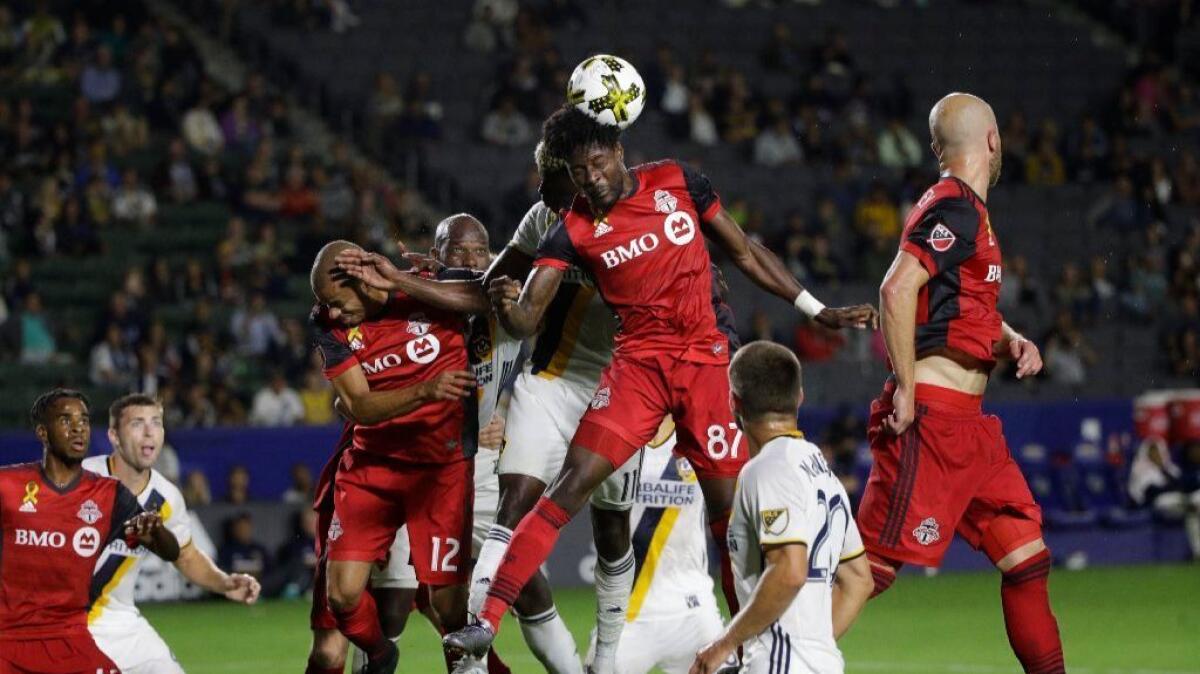Column: Players alone aren’t responsible for Galaxy’s disastrous season

- Share via
After the Galaxy’s last home game, an uninspired 4-0 loss to Toronto FC, coach Sigi Schmid closed the locker room doors and addressed his players.
“The main message was that guys are playing for their jobs,” goalkeeper Jon Kempin said. “Play for some pride.”
Given the way the team responded, it seems some of the players don’t really want their jobs nor have much pride. If Schmid thought the Galaxy hit bottom when they quit in the Toronto game, he must have been surprised when the team tunneled even deeper into ignominy four days later by sleepwalking through Wednesday’s 4-0 loss to an expansion team in Atlanta.
But the players aren’t the only ones to blame for the worst season in franchise history, one that likely will continue Sunday when the Galaxy meet Sporting Kansas City (Ch. 13, Fox Deportes, 11 a.m. PT). The players shouldn’t be the only ones whose jobs are on the line.
Dan Beckerman, CEO of the Anschutz Entertainment Group, the Galaxy’s parent company, approved last winter’s offseason makeover, and team president Chris Klein, general manager Pete Vagenas and technical director Jovan Kirovski executed it. They also bear responsibility.
And if they didn’t know that before the Toronto game, they found out afterward. While Schmid was calling out the players in the locker room, team owner Phil Anschutz was in a luxury suite below the StubHub Center’s press box, questioning the front office and demanding answers.
Answers for why the Galaxy, at 7-16-6, already have tied the franchise record for most losses and need two wins in their final five games to avoid tying the team record for fewest victories.
Answers for why only one MLS team has allowed more goals and only two have a worse goal differential than the Galaxy, who have been shut out seven times in their last 11 games, a span in which they have scored only eight goals.
Answers for why a team that made eight consecutive playoff appearances and won three MLS titles since 2011 could finish last in its conference for the first time this year.
Last fall, the Galaxy allowed Bruce Arena, their coach and general manager, to leave for the national team, then allowed Vagenas, Klein and Kirovski to raze the foundation he left behind.
Arena fielded high-paid, experienced teams. Klein and Vagenas, both former directors of the Galaxy’s development academy, took a different approach.
By letting Robbie Keane and Steven Gerrard go, they jettisoned $10 million in designated-player salary, cutting the payroll nearly in half. The team denied it was cutting costs, but also got rid of veteran leaders such as Alan Gordon, Jeff Larentowicz, A.J. DeLaGarza, Dan Kennedy, Mike Magee and Landon Donovan, each of whom had played at least 125 games in MLS. Replacing them were players such as Nathan Smith, Bradley Diallo, Hugo Arellano, Ari Lassiter, Jaime Villarreal and Clement Diop, none of whom had participated in more than four MLS games entering the season.
None of the new players was ready to step into starting roles when a wave of injuries decimated the Galaxy, but coach Curt Onalfo, who was fired 20 games into the season, and Schmid, his successor, had to use them anyway, leaving homegrown players and products of the Galaxy’s USL affiliate to absorb nearly 40% of the playing time.
Injuries are an excuse, not a reason, for the terrible season; the team was so poorly constructed it would have struggled had no one sustained anything worse than a paper cut.
The blueprint called for Gyasi Zardes to play primarily as a striker, a position that requires creativity and the ability to finish. Zardes has neither.
The decision to trade DeLaGarza in January, while Robbie Rogers was limping toward the season-ending injury list, left the team with no depth and little versatility on the back line. And while the team was loaded in the midfield, the pieces didn’t fit.
Jermaine Jones wasn’t sure whether he was an attacking midfielder or a holding one; Gio dos Santos couldn’t decide if he was a playmaker or a play finisher. Then the team went out and signed his brother, Jonathan, doubling down on a bad idea.
Members of the previous coaching staff wondered about the wisdom of signing Gio dos Santos, whose short stays with seven European clubs led to questions about his commitment. Now the Galaxy are stuck with him and his brother, with Jonathan saying his desire to sign a multiyear designated-player contract was based largely on his desire for a family reunion.
In the winter, Beckerman and Co., were confident — even arrogant — about their plan to rebuild the team using smart DP spending, targeted allocation money, or TAM, and the fruits of the Galaxy’s academy system. Asked in February whether he liked this year’s roster or the one that came within a penalty kick of the conference final last year, Klein didn’t hesitate. “I’ll take this one,” he said.
The team’s fans are looking for answers too. After the Toronto game, more than 30 members of the Angel City Brigade, one of the Galaxy’s two main supporters’ groups, ignored sheriff’s deputies and refused to leave their seats in the north grandstands until someone from the team came to address them.
Eventually, midfielder Romain Alessandrini, who didn’t even play that night, showed up to apologize.
The Galaxy used to be soccer’s version of the New York Yankees: the classiest, most successful and most admired franchise in the league. Anschutz, the man who single-handedly saved the league from financial ruin in 2001, was the sport’s king. That’s why the league champion gets not the MLS Cup, but the Philip F. Anschutz Trophy.
This season, the Galaxy have been more like baseball’s Miami Marlins: hopeless, helpless and facing a long climb back to respectability. That makes Anschutz soccer’s Jeffrey Loria.
No wonder he’s mad.
Follow Kevin Baxter on Twitter @kbaxter11






